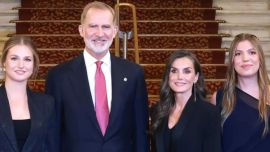Alberto Fernández is not the only person who thinks the coronavirus vaccines now coming on stream ought to be regarded as “global public goods” which should by rights be shared out equitably, presumably without charge, so everyone in the world gets his or her jab at more or less the same time. Apart from a handful of unabashed nationalists, almost all politicians – including those in countries like the United States, the United Kingdom, Germany and Russia where effective vaccines have been developed – say they agree with him on principal but, unfortunately, they have to take into account the feelings of their selfish compatriots who, being the kind of people they are, insist they should come first and are therefore reluctant to let their governments be more generous.
This approach, which could be summed up by the old saying “charity begins at home,” would merit criticism if the “warp-speed” creation of effective vaccines against Covid-19 could be attributed to nothing more than the efforts of a brave band of public-spirited individuals. However, even the Oxford University team, which from the word go made it clear they wanted whatever they came up with to be made available to people who by themselves would never produce anything workable, and their counterpart in Moscow, had to depend on large doses of government – that is to say, taxpayers’ – money to achieve what they did, while Pfizer is a commercial enterprise and makes no bones about it. Had everything been left entirely to humanitarians seeking to save mankind from the rampaging pandemic, the vaccines that are already being applied in rapidly increasing quantities would still be little more than a pious aspiration.
For self-evident reasons, politicians in poor countries, among them Argentina, have always been keen on the idea that technological advances, especially those involving pharmaceutical products, coming from rich countries should be considered universal “public goods,” while natural resources, such as oil, minerals of one kind or another and good farm land belong exclusively to the inhabitants, or the rulers, of wherever they happened to be found. When he was still with us, Raúl Alfonsín made much of this (to him appealing) idea when, as politicians so often do, he wanted to tug at the world’s heartstrings in the hope of getting something for free.
For those who think this way, patents are bad. In their view, nobody has a right to make a profit from his or her ability to invent new things or improve existing ones, but there is nothing at all wrong when countries rake in billions just because they were lucky enough to hit the geological jackpot. However, while this sort of stuff goes down well in international conferences where speakers make much of their willingness to help the poor, it is based on attitudes which, when adopted by large numbers of people, are positively harmful.
A big difference between highly productive societies, in which almost everyone lives better than was the case a generation ago, and the laggards, in which extreme poverty is still ubiquitous, is that in the former intellectual achievement is materially rewarded, while in the latter it counts for far less than one’s personal connections. Here, being in the good books of a political operator can bring in more money than hard work or trying to run a business, which is why the numbers of those who depend on government largesse were rising well before the coronavirus made its arrival.
Until half a century or so ago, it was taken for granted that countries with plenty of natural resources were bound to be richer than others. That was why distinguished economists told us that the diverging fates of Argentina, which had huge amounts of them, and Japan, which had hardly any, was an aberration that left them flummoxed. Their successors know better. Thanks in large measure to the sudden rise of the West Coast “technological giants,” enterprises such as Apple and Google, which have no material resources to speak of but a great deal of brainpower, are worth more than the oil producers, mining companies or automobile manufacturers which for decades had topped the league tables. With “green” policies now very much in fashion, the gap between knowledge-based firms and the rest looks certain to continue widening at an accelerating rate.
Will Argentina, a country whose political culture is suffused with notions about entitlement and, as Alberto is fond of reminding us, is hostile to the very idea of individual “merit,” be able to prosper in the brave new world that is coming our way? Not unless she manages to change lanes in the near future. As things stand, this is most unlikely to happen. For its own reasons, the country’s staunchly conservative political elite, which is currently dominated by its most reactionary wing led by a lady who dreams of going back to the 1970s, is evidently determined to thwart all efforts to change the socioeconomic structures that were consolidated by Juan Domingo Perón midway through the 20th century and have easily survived the sporadic attempts to dismantle them which were made by military regimes and those civilian ones, among them Carlos Menem’s and Mauricio Macri’s, which at least understood that the by-then traditional set-up was incompatible with anything resembling progress.
No doubt the technologically advanced countries do have a moral duty to help the rest until they catch up, but among these there are many whose leaders are more interested in benefitting from what others do than in contributing anything positive themselves though, to be fair, some, like Argentina, did collaborate with companies developing vaccines when they were still at a trial phase.
In any event, while Argentina has no lack of capable individuals who, if given a bit of leeway, could add much to the world’s stock of useful scientific knowledge or put together highly profitable enterprises, the political establishment seems intent on driving them to seek their fortune abroad, as more and more are now doing. Many of its members, including Alberto and his aides, are doing their best to persuade the millions who already live off handouts that they deserve to receive far more than they are getting but a mean-minded minority, which happens to be productive, is refusing to let them have what should be theirs by rights. While this may help them get more votes, it does nothing at all to bring about the cultural changes that would have to take place for Argentina to adapt to the fast-approaching high-tech world order in which good ideas and the ability to apply them quickly will be worth far more than any amount of soybeans or shale oil.



















Comments